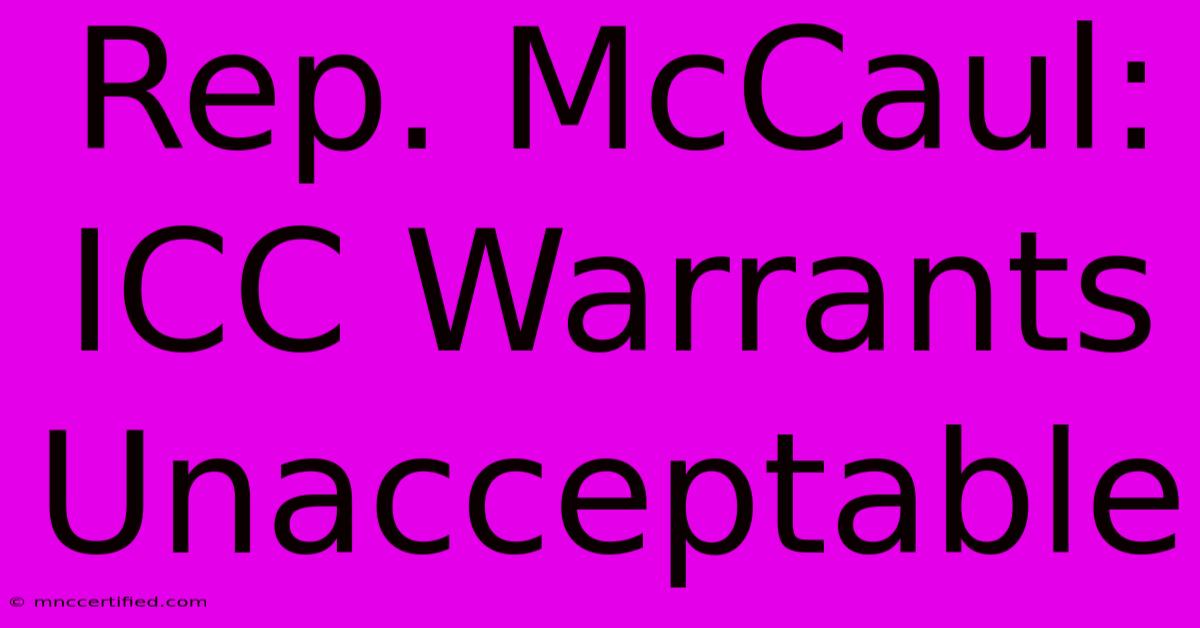Rep. McCaul: ICC Warrants Unacceptable

Table of Contents
Rep. McCaul: ICC Warrants Unacceptable – A Deep Dive into the Controversy
Representative Michael McCaul's strong condemnation of the International Criminal Court (ICC) warrants targeting Russian officials has ignited a firestorm of debate. This article delves into the specifics of McCaul's statement, the underlying geopolitical context, and the broader implications of the ICC's actions.
Understanding Rep. McCaul's Position
Rep. McCaul, a Republican and Chairman of the House Foreign Affairs Committee, has vehemently denounced the ICC warrants as "unacceptable" and a dangerous overreach of the court's authority. He argues that the warrants, which allege war crimes committed in Ukraine, undermine national sovereignty and could set a dangerous precedent for future international relations. His statement reflects a broader Republican skepticism towards international bodies, particularly when perceived as interfering with U.S. interests or those of its allies.
Key Arguments Against the ICC Warrants:
- Violation of Sovereignty: A central theme in McCaul's criticism is the belief that the ICC warrants represent an unacceptable intrusion into the domestic affairs of Russia and potentially other nations. He argues that nations should retain the primary responsibility for prosecuting crimes within their own borders.
- Political Motivation: Some argue that the ICC's actions are politically motivated, driven by a biased perspective against Russia. This perspective suggests the warrants are less about impartial justice and more about furthering a specific geopolitical agenda.
- Lack of U.S. Cooperation: The U.S. is not a member of the ICC, and McCaul's stance reflects a long-standing policy of non-cooperation with the court. He emphasizes the U.S. commitment to holding individuals accountable for atrocities but prefers alternative mechanisms to the ICC.
- Potential for Retaliation: The warrants could escalate tensions and provoke retaliatory actions from Russia, further destabilizing an already volatile geopolitical landscape.
The Geopolitical Context: Ukraine and the ICC
The ICC's investigation into alleged war crimes in Ukraine, including the warrants targeting Russian officials, is inextricably linked to the ongoing conflict. The warrants are a direct response to reports of widespread atrocities, raising questions about accountability and international justice. The actions taken by the ICC are viewed differently by various actors based on their geopolitical alliances and interests.
Counterarguments and Alternative Perspectives
While Rep. McCaul's position enjoys significant support within certain circles, it also faces substantial criticism. Critics argue that:
- Accountability for Atrocities: The ICC warrants are essential for holding those responsible for war crimes accountable, regardless of their nationality or political affiliation. Failing to pursue justice undermines the rule of law and allows atrocities to go unpunished.
- International Justice: Supporters of the ICC emphasize the importance of an independent international body to prosecute crimes against humanity when national jurisdictions are unable or unwilling to do so.
- Universal Jurisdiction: The principle of universal jurisdiction allows states to prosecute individuals for crimes against humanity regardless of where the crimes were committed or the nationality of the perpetrators. This is often viewed as crucial for achieving justice when national systems are compromised.
The Future of the ICC and US Relations
The ongoing controversy surrounding the ICC warrants highlights the complex relationship between the U.S. and international institutions. Rep. McCaul's strong stance underscores the deep divisions regarding the role and authority of the ICC, and the debate is likely to continue shaping US foreign policy and international relations for years to come. The potential for increased tensions and the long-term impact on the ICC's credibility remain open questions.
Keywords: Rep. McCaul, ICC, International Criminal Court, war crimes, Ukraine, Russia, national sovereignty, geopolitical, international justice, accountability, US foreign policy, sanctions, international relations, war crimes investigation.

Thank you for visiting our website wich cover about Rep. McCaul: ICC Warrants Unacceptable. We hope the information provided has been useful to you. Feel free to contact us if you have any questions or need further assistance. See you next time and dont miss to bookmark.
Featured Posts
-
Major Ground Beef Recall Announced
Nov 22, 2024
-
Maura Higgins I M A Celeb Hangover
Nov 22, 2024
-
Griffin Insurance Statesville Nc
Nov 22, 2024
-
Bondi Replaces Gaetz As Attorney General
Nov 22, 2024
-
Rooney Skips Coleens I M A Celeb
Nov 22, 2024